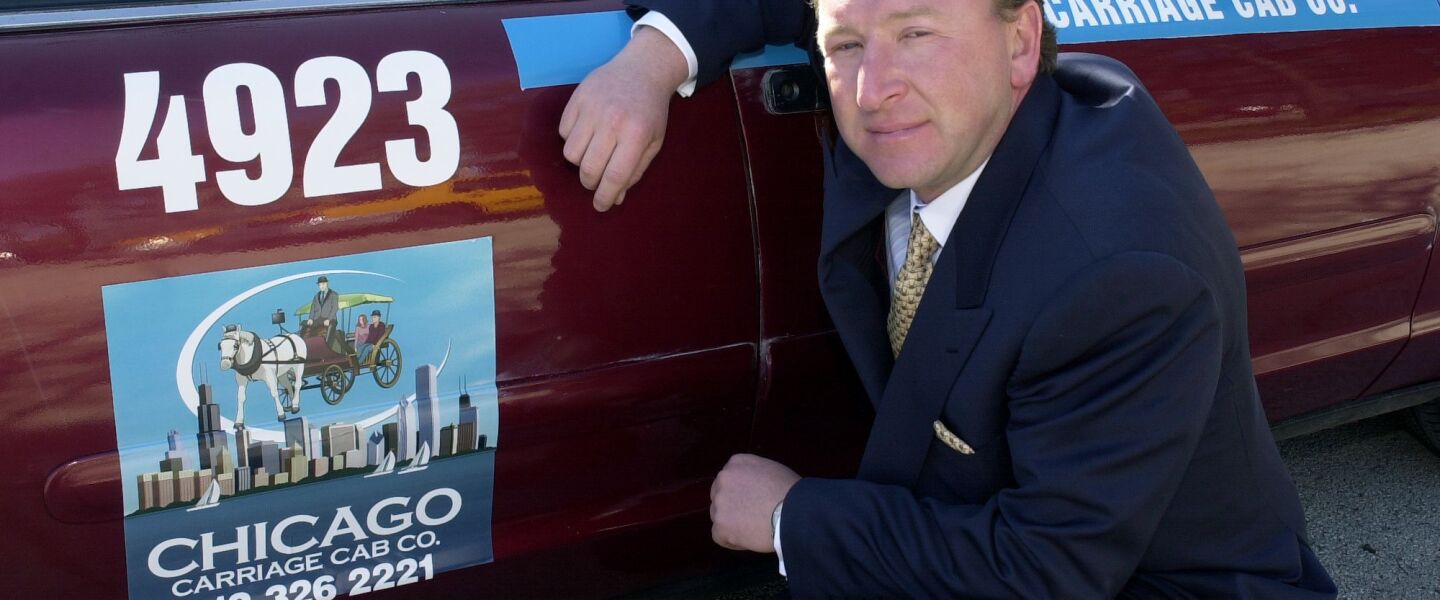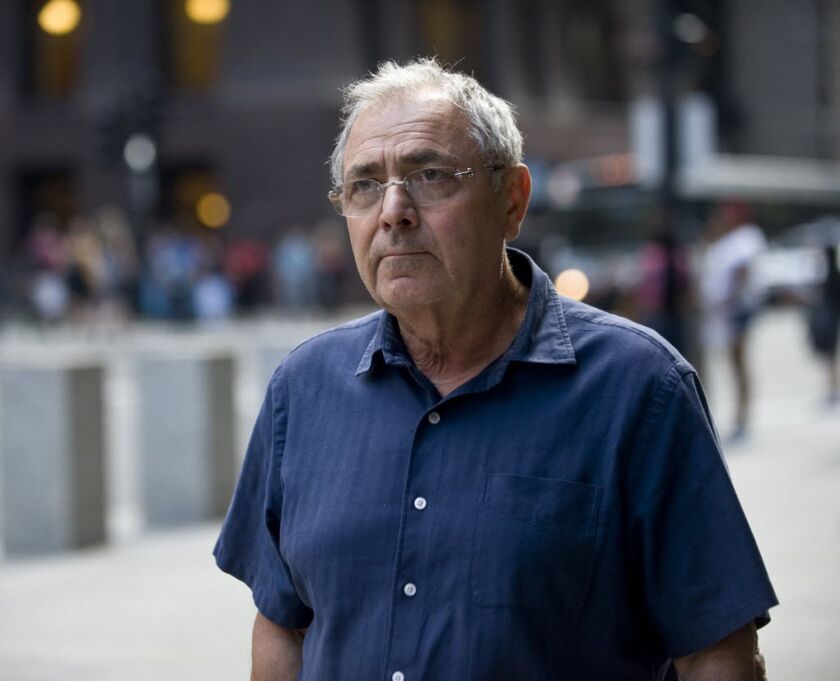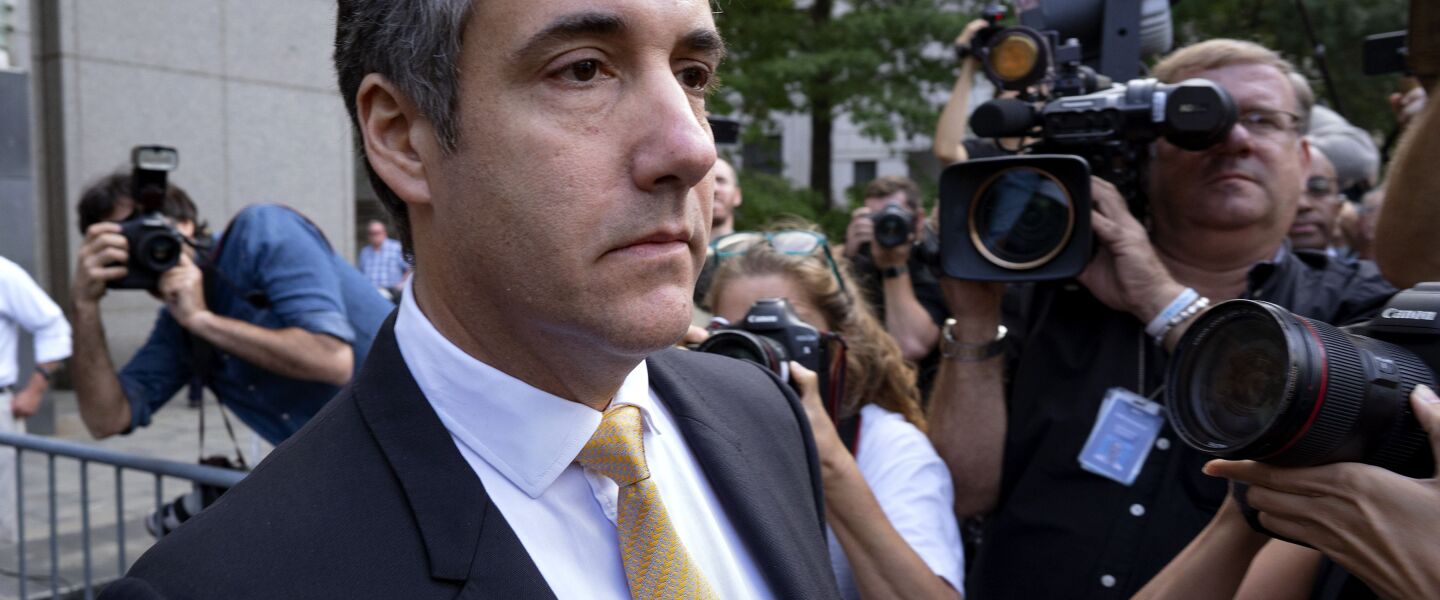After befriending the son of then-Mayor Richard M. Daley nearly two decades ago, Symon Garber built the city’s largest fleet of taxis.
He became Chicago’s taxicab king, at one point operating 800 cabs. But today he appears to be out of business.
No one answers the phone at the offices near McCormick Place, where his fleet of maroon-colored cars sits idle inside a fenced property he recently sold to a developer who plans to build an arena across the street for esports competitions.
A judge has ordered Garber to pay $47.6 million to settle one of many lawsuits his lenders have filed to collect the millions in loans they gave him based on the soaring prices of his taxi medallions — the embossed pieces of metal issued by the city of Chicago that confer the right to operate a cab and which are bought and sold for whatever price the market might bear.
Garber’s rise and fall was part of a takeover of the taxi industry in Chicago by out-of-town investors who caused the price of medallions to soar, then used them as collateral to get millions in loans that financed their high-flying lifestyles. All of that collapsed with the advent of ride-sharing and later the coronavirus pandemic. For most Chicagoans, the only sign of any of this was seeing fewer cabs on the streets.
Garber is among a group of immigrants from the former Soviet Union who operated taxis in New York City, then ended up dominating the market in Chicago, where they helped drive up the price of a cab medallion to $375,000 in 2012.
That’s the year City Hall began allowing ride-sharing companies like Uber and Lyft, which face fewer regulations than cabs, to operate in Chicago.
Garber and other taxicab moguls saw medallion prices plummet, and they stopped repaying their loans, just as many homeowners did during the national housing crisis when they found their homes were worth less than the mortgages they had on them.
These days, a Chicago taxi medallion can be had for $25,000, a fraction of its peak cost, according to a recent sale, just a week before Christmas.
Garber and the others who came to the United States from what was then the Soviet Union and gained control of hundreds of Chicago’s medallions have more than that in common. They also have all been business partners with Michael D. Cohen, President Donald J. Trump’s former attorney and fixer, who lost millions when he was forced to sell his 22 Chicago taxi medallions while he was in prison over a scheme related to hush-money payments made to a porn star. And like Cohen, Garber and most of the others have lived in buildings Trump developed in New York City.
Cohen sued a Ukrainian couple, Yasya and Semyon “Sam” Shtayner, who once managed his Chicago medallions. The Shtayners also are being hounded by one of their medallion lenders, which is trying to collect on a $28 million judgment against the couple, who regularly leased a Rolls-Royce, have a swimming pool on the balcony of their Florida condo, invested in a marijuana business in Las Vegas and sold two Hermes handbags to a resale shop 16 months ago for $60,000.
Garber, the Shtayners and the others owned more than 660 Chicago medallions that ended up in foreclosure, according to city records.
Altogether, more than 2,300 medallions have been in foreclosure during the past six years.
Many owners have surrendered their medallions to City Hall for nothing or put their cabs on inactive status.
That’s left Chicago with just 703 active medallions as of December, a drastic decline that came as people stayed home because of the coronavirus pandemic. Another 350 of the medallions are on cabs that are still operating though they apparently are in foreclosure.
As Garber and other medallion owners battle their lenders in court, it’s unclear whether they ever will resume operations in Chicago. Most of them, including Garber, couldn’t be reached or wouldn’t agree to interviews.
Also uncertain: what will happen to the thousands of medallions and cabs controlled by these taxi kingpins:
Symon Garber
A Ukrainian immigrant, Garber was a taxi mogul in New York City two decades ago when he met Patrick Daley, the son of Chicago’s then-mayor — the office-holder who controls how many cabs can operate on the city’s streets.
“We met in Russia somewhere in August 2001,” Garber told the Chicago Sun-Times in 2008. “Me and Patrick are very good acquaintances.”
Two years later, City Hall gave Garber a license to do business in Chicago, starting with 200 taxis, a number that within five years mushroomed to 800 cabs. Garber said in 2008 that Daley’s son didn’t pull strings for him.
“Patrick didn’t help me with anything,” he said. “The only business deals were with a bottle of vodka. Patrick is an excellent guy. Great drinker, knows how to hold his liquor. We played some rugby. He has a great sense of humor.”

Click here to read the Sun-Times’ Feb. 1, 2010, report on Symon Garber, then Chicago’s taxicab king.
Garber was flying high then with two companies — Chicago Carriage Cab Co. and Royal 3 CCC — dispatching his distinctive maroon-colored taxis, many of them festooned with a logo of a polo player, the sport that has occupied the interest of the flashy businessman for years.
He also created Triglobal Financial Services, which lent money to finance medallions for his own companies and for his competitors.
Now 54, Garber fell on hard times starting in 2011, when the Daley administration slapped him and his companies with $815,000 in fines for secretly operating wrecked and salvaged vehicles as taxis, which City Hall bans.
That crackdown led to a one-year prison sentence for Garber’s company president, Aleksander Igolnikov, who admitted being involved in the falsification of state vehicle records so he could outfit 112 salvaged cars as cabs. Igolnikov said at the time he was under pressure to find cars for all of the medallions Garber had bought.
“I’m not in the business for 10 years,” Igolnikov says now, declining to comment further.
The cab business has been devastated by an influx of ride-sharing companies, which operate with fewer regulations than taxis. Garber bankrolled a federal lawsuit that unsuccessfully aimed to force City Hall to make the ride-sharing companies play by the same rules cabs must.
Garber’s business decline reached a point last Aug. 7 that a New York judge ordered him to pay $47.6 million to Signature Financial Inc., which had foreclosed on 28 loans he got in the summer of 2015 using 123 of his Chicago medallions as collateral.
As sale prices for medallions soared, that increased the value of all medallions. Often, owners used that equity to borrow more money.
According to City Hall, foreclosure suits have been filed against 281 medallions Garber operated, most which he or his relatives owned.
Twenty days after the judge in New York entered that order, Garber sold his taxicab headquarters at 2617 S. Wabash Ave. for $2.6 million to Scott Greenberg, a Lincolnshire developer who’s planning a retail project to complement an esports arena he wants to build across the street.
Garber also is trying to sell a nearby property at 2630 S. Dearborn St., where more of his cabs have been sitting idle during the pandemic.
Michael D. Cohen
Garber’s success in Chicago caught the attention of other New York taxi magnates. Among them was Cohen, who owned several New York medallions that Garber’s company managed until they had a falling out.
“New York saw Chicago as the next up-and-coming city to invest in,” Cohen tells the Sun-Times. “Knowing all the players in New York, I decided to invest in Chicago.”
In 2010, Cohen was a high-ranking executive with The Trump Organization when he paid $1.8 million for 10 Chicago taxi medallions, making a deal to have them operated as Flash Cabs by Chicago Medallion Management Company.
Chicago Medallion is owned by the family of Semyon Shtayner, who also has operated cabs in New York. Records show the Shtayner family owes millions of dollars to Cohen and his father-in-law, Fima Shusterman, another Ukrainian immigrant.
About three years later, Cohen paid $3.9 million for 12 more Chicago medallions, striking a deal for them to be operated by Dispatch Taxi, co-owned by two other New York cab titans, Evgeny “Gene” Freidman and Savas Tsitiridis. Freidman is a Russian immigrant who has since pleaded guilty to felony tax fraud, admitting he cheated a New York transit agency out of $5 million in taxes.
Cohen’s investments soured — along with his relationships with Shtayner and Freidman — over a string of events that began with ride-sharing’s explosive growth, which sent medallion prices plummeting.
Then, Cohen became the target of a federal investigation over a $130,000 payoff he made to porn star Stormy Daniels to silence her allegation that she’d had sex with Trump.
Cohen later pleaded guilty to charges that included failing to report income he received from his taxi operations in Chicago.
Cohen, 54, was serving his three-year prison sentence when Mayor Lori Lightfoot’s administration sent him an email on Nov. 20, 2018, notifying him that convicted felons aren’t allowed to own Chicago taxi medallions and leaving him with two choices: Sell, or City Hall would seize them.
Cohen’s wife signed papers in the fall of 2019, selling the 22 medallions to Tsitiridis, who is now suing his former partner Freidman. Tsitiridis agreed to pay $40,000 apiece for them, a total of $880,000, by September 2029. He has yet to make any payments, Cohen says.
“I lost millions of dollars,” says Cohen, who stands to lose about 85% of his $5.7 million investment.
He says he had to pay City Hall more than $100,000 in fines for violations including having expired insurance and license plates.
Cohen, who, because of the coronavirus, has been freed to serve the remainder of his prison sentence at his New York City home, has harsh words for former Mayor Rahm Emanuel, whose brother Ari Emanuel has a financial stake in Uber.
“Rahm Emanuel sold the [taxi] industry down the tubes,” Cohen says.
Emanuel won’t comment.
“I invested in an industry that is extremely important for immigrants,” who often are hired to drive cabs, Cohen says. “And then comes Uber. And they are given an indefinite amount of licenses to operate with no fee to the city. They are given the same rights that you are given as a medallion for zero.”
Given the down market, why did Tsitiridis buy Cohen’s medallions?
“I must have been delusional that week,” Tsitiridis says. “He needed to get out of it. I decided to step in and hope things would level off and turn around.”
Tsitiridis has his own financial troubles. Among them is a $10.3 million foreclosure lawsuit filed in Cook County by Melrose Credit Union, which says he didn’t repay his loans on 42 medallions.
Melrose is one of three New York credit unions that specialized in making loans for taxi medallions that have gone belly up. The National Credit Union Administration estimates that credit unions have lost more than $700 million on loans made to taxi medallion owners.
“I’m getting sued,” Tsitiridis says. “I have judgments” from judges in Chicago and New York. “As far as I know, everybody in the industry has the same problems. It’s a complete mess. I don’t know how it’s going to end.”
Evgeny ‘Gene’ Freidman
When Tsitiridis decided to expand his taxi business to Chicago, he hooked up with Freidman, who operated 800 cabs in New York. They established Dispatch Taxi in 2012 and ultimately managed as many as 400 medallions, including a dozen owned by Cohen.
“I didn’t know [Freidman] very well,” Tsitiridis says. “I didn’t have a personal relationship with him. I thought it would be easier starting a business in another city with a partner.”
Tsitiridis won’t say who suggested they become business partners.
Freidman invested $1.2 million in Dispatch Taxi, but Tsitiridis says in an ongoing Cook County lawsuit that his partner began taking money from the company, including $360,000 in tickets for the Chicago Bulls.
“I’ve made many offers to settle, but he won’t,” Tsitiridis says. “It’s close to $5 million.”
Freidman’s legal problems have included a 2015 judgment handed down by a Cook County judge ordering him to pay nearly $8.5 million to Capital One Taxi Medallion over delinquent medallion loans. He faces judgments involving $400 million in debts, The New York Times has reported.
He pleaded guilty to tax-fraud charges in May 2018, admitting he pocketed a 50-cent surcharge paid by taxi customers for several years, costing the New York State Department of Taxation and Finance nearly $5 million.
Freidman — who was a lawyer but has been stripped of his law license by the state of New York — agreed to cooperate in the federal tax-fraud case against Cohen and in October 2019 was sentenced to five years of probation. He has paid $1 million in restitution to the state of New York.
Freidman couldn’t be reached.
Semyon ‘Sam’ Shtayner
When the FBI raided Cohen’s Manhattan office in April 2018, agents were seeking records regarding his connections to Chicago Medallion Management, a West Town company owned by Shtayner and his wife Yasya that operated 368 medallions, including 10 owned by Cohen, under a variety of names, including Ace, Checker and Yellow.
The Shtayners are longtime acquaintances of Fima Shusterman, Cohen’s father-in-law. The Shtayners and Shusterman’s family all emigrated from Ukraine to New York City decades ago. All operated cabs in New York, with the Shtayners branching out to Chicago and setting up a business with their three sons Elvin, Felix and Stanley.
Besides being friends with the Shtayners, Cohen and Shusterman also have lent money to them. Cohen has given the Shtayners $6 million in loans secured by a mortgage on the couple’s 6,200-square-foot penthouse condo in Sunny Isles Beach north of Miami on their building’s 45th floor, with a 2,770-square-foot terrace and a private pool. It’s listed for sale at $14.9 million with a monthly assessment of $9,200. Yasya Shtayner testified in a recent court deposition that Cohen’s loan helped refinance the condo and buy medallions.
Cohen won’t discuss the loan, for which he charged the Shtayners 12.25% interest, or $61,250 a month. He reached an $8.2 million settlement in August with the Shtayners, who dropped their counterclaims. The Shtayners have spoken with the FBI about Cohen.
Cohen’s father-in-law also has given the Shtayners millions of dollars in loans.
In August 2017, Shusterman filed four liens — for at least $2 million apiece, one of them for $4 million — on four Chicago properties owned by Yasya Shtayner, three condos in a Gold Coast building and the cab company headquarters. In March 2018, Shusterman placed four additional liens on those properties, for between $3 million and $6 million each.
Altogether, Shtayner’s wife owes Shusterman between $20 million and $40 million, according to the liens.
But in a court deposition last Oct. 2, Semyon Shtayner said they owe Shusterman only $5 million, money he said they used to buy medallions.
“It’s $5 million going over four different properties,” Shtayner says, disputing a Sun-Times report that the loans were for at least $20 million. “That’s what the newspaper said, that I borrowed $26 million from him. So they didn’t know how it works.”
Shusterman, 75, who lives in a Trump building near the United Nations in New York, won’t talk about the loans in any detail, saying: “I don’t want to talk about it. It’s private.”
Shusterman and an attorney for Semyon Shtayner referred questions to Shtayner, who didn’t return messages.
Like many taxi medallion owners, the Shtayners have been sued by lenders for failing to repay loans, including Signature Financial, which got the $47.6 million judgment against Garber.
Signature also obtained a $28.3 million judgment against the Shtayners in August 2019, when a federal judge in Chicago found they’d defaulted on loans involving 116 medallions.
Signature has been battling to collect from the couple, who records show failed to produce all of their financial documents and have yet to surrender all of the medallions to the lender.
They have given four depositions, repeatedly saying they couldn’t recall specifics about their finances — including whether they made any payments to the law firm they hired to fight Cohen’s foreclosure suit or what Shtayner did with a cash gift of $25,000 he got from his mother.
“Is there a reason why you do not recall the answers to any of these questions?” Signature’s lawyer asked Semyon Shtayner last Sept. 10 at his third deposition.
“Because I don’t recall,” Shtayner responded.
Shtayner’s wife testified that she sold two Hermes bags for $60,000 in September 2019 to pay the $9,000 monthly assessments on her south Florida condo.
Other times, those assessments were paid by Chicago Medallion Management, but she said she couldn’t explain why.
She testified that she had spent $3,000 a month to lease a 2016 Bentley Mulsanne and that the Chicago taxi company previously covered a $4,000-a-month lease for a 2011 Rolls-Royce Phantom Drophead Coupe that since has been repossessed.
She said she knew her husband sold a New York City condo for $5 million but said she didn’t recall why she got $400,000 from the sale of the property or what happened to the money.
“You have to ask my husband,” she said. “He directed me to do something else with it. I don’t remember.”
Yasya Shtayner, 63, is listed as the owner of the family’s cab business and of the couple’s real estate holdings because “I just wanted her to be a rich woman, that’s all it is,” Semyon Shtayner said in a Dec. 27, 2019, deposition.
Shtayner said he invested more than $3 million from his real estate deals in developing a facility to grow marijuana in Henderson, Nevada. But the project has stalled, with Shtayner suing his partner, attempting to collect about $1 million, he said in the deposition.
Shtayner, 66, testified about filing suit against Cohen.
“Well, he — him and his actions tremendously hurt me during the process and create me a lot of hardship in the business relationships and in social relationships as well,” he said of Cohen in his deposition. “We had original loan documents, so they start trailing the money. I was called to Department of Justice three, four times.
“I was testifying about the transaction and how everything went. I provided them with thousands of documents and happened to be that he was not paying the taxes on the money that he was receiving. He was part of a tax-evasion case, and, to me, it was too much of a commotion. All the banks started throwing me out from every place and closing my accounts, and, you know, everybody was scared to talk to me on the phone. It was a lot of hardship for that.”
Contributing: Caroline Hurley










